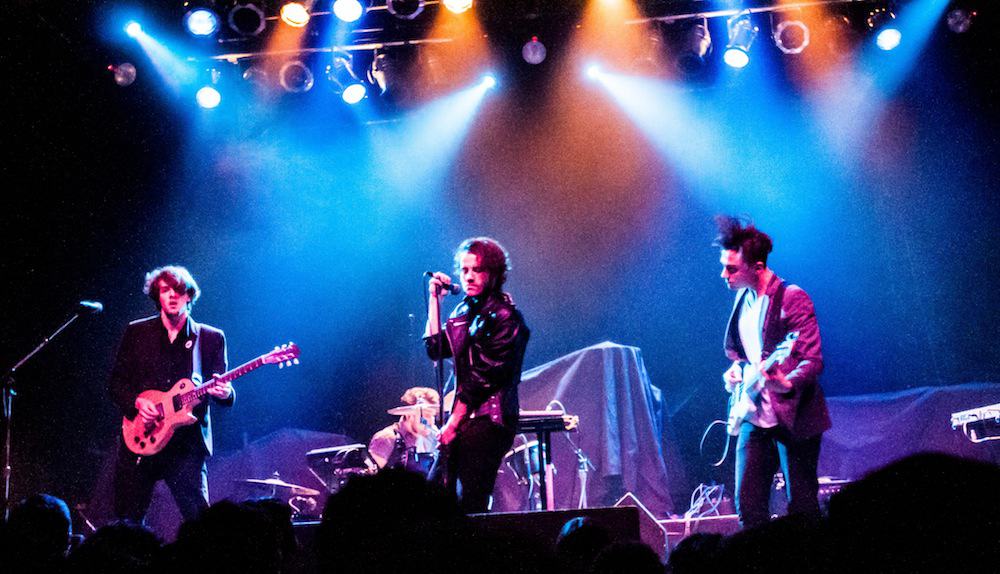Listen to Nightbox, and you’re left longing for the weekend. Since relocating from Dublin, Ireland to Toronto in 2010, the Kensington-based quintet have been moving crowds across North America to their unique blend of indie dance riffs and potent electronic breakdowns. With self-professed lust for raucous crowd response, the band member uses their captivating stage presence to deliver energetic displays of musicianship, punctuated with the occasional Daft Punk cover. I caught up with bassist Andrew Keyes and guitar player James Tebbitt before their most recent set at the Phoenix Concert Theatre to discuss life on tour, moving to Toronto, and the origins of their distinctive sound.
The Varsity: Tell us about the formation of Nightbox, and about the decision to relocate to Toronto from Dublin.
James Tebbitt: We all went to the same high school together, that’s the basis of how we met. Jacob Bitove (lead vocals) and I became friends playing guitar, later Keyes joined us on bass. Prior to that we were actually another band, The Trotsky’s. It had Nick Bitove (drums) and James Shelly (synths) leading the band. Shelly was the singer at the time. Eventually the two of them left for college in the States. A few years later, when we all had finished with school, we all moved to Toronto in 2010.
Andrew Keyes: Jacob and Nick always had some family in Toronto, and we had always had it in our heads to take a year or two once we were out of school to try to start a band together. Initially, we never thought we’d take the band as seriously as we have. It was more of an adventure. We ended up taking things year by year, and that’s where we are now.
TV: What were your initial impressions regarding the Toronto music scene when you guys arrived in 2010?
JT: When we first came we were still figuring out who we were as a band. We found that just the size of the city, with so many different types of music, so many more people, offered a lot.
AK: There’s a lot of really great venues around Toronto that never put on any bad bands. If you go to places like The Horseshoe Tavern, the Hideout, Wrongbar — these are all places right around our house. You never have to walk far, and you don’t always know who’s playing, but you’re guaranteed to have a good time and hear some musicians who kick ass.
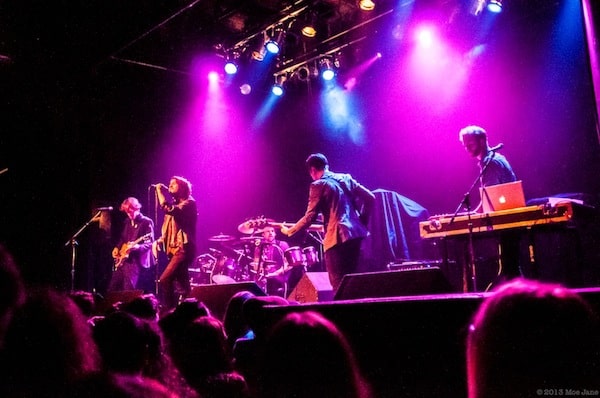
TV: Who were some of those acts that left an impression in the early days?
AK: Babe was a big one for us, though they aren’t together anymore. Bravestation too, they’re still working away.
JT: Any indie-dance vibe, with more European sounds, we gelled with, because we had something in common to talk about.
TV: Nightbox definitely has incorporated a lot of great electronic elements, as well as guitar driven rock and roll into its sound. Who brings the different musical influences to the table?
AK: I think different lads in the band brought different things to the table. I find that myself, Nick, and Tebbitt have more of a natural inclination to rock out a bit, and make things loud. Jake and Shelly, they like to write a lot of electronic music. Sometimes it almost seems like Jake and Shelly will come to us with an electronic idea and we’ll rock it up, or vice versa. It’s yin and yang.
JT: We all have a mutual love for the same music though. I’ll listen to dance records a lot, maybe rock a little more. But we all listen to electronic a lot.
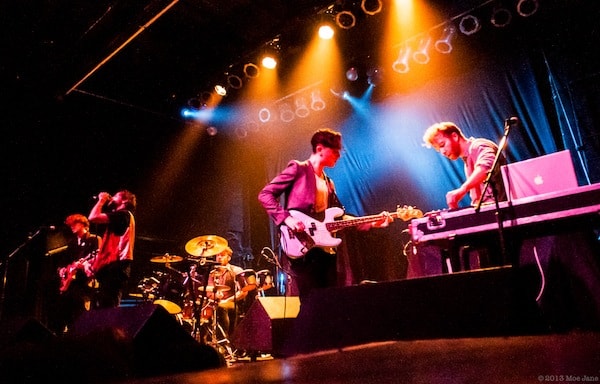
TV: Coming from a background of indie and rock, was it a big adjustment to start playing and writing music with a more electronic flavor?
JT: Well yeah, it’s all a gradual process. When we first came to Toronto, we were trying to figure out what electronics were in our band, and how they fit in. Still today, it’s a process that is constantly evolving for us.
AK: Music is always a product of the environment that it’s created in. When we first moved over to Torontom, we played in a basement, which was loud, so a lot of the songs were naturally more guitar-driven. Then we moved to another place, where we were practicing entirely through headphones. So we had an electronic drum kit, the bass and guitars became quieter, and as a result the songs became more electric. Now I feel like we are at the stage where we are finding a balance in terms of what works.
TV: Tell us more about the sound of the newer material in light of that balance.
AK: In the past, we were a lot more inclined to make sure that everything was very textured, and had a really lush sound to it. Now, we’re definitely embracing the negative space. We’re not afraid to have an awesome part on its own. We’re working on the vocals a lot more too, a lot more harmonies. Tebbitt happened to be playing a lot of acoustic guitar, so there’s a lot more of an acoustic element on some of the newer tracks, which we had never done before.
JT: It’s a blend of electric and acoustic together.
AK: One thing I think we all love is when you hear acoustic elements in dance music. I lose my mind when I hear a sweet sounding piano or kick ass guitar on a dance track. That’s what we’re trying to replicate.
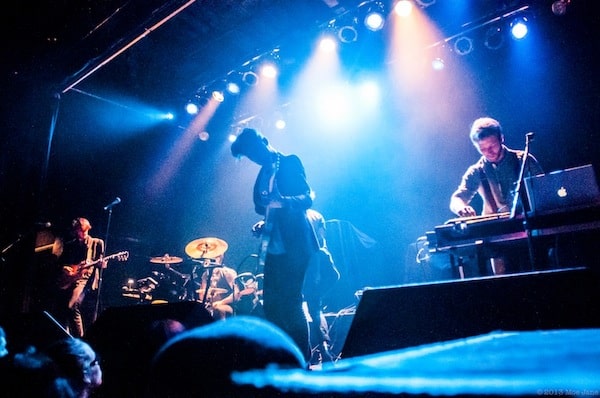
TV: Something that’s been big for your guys in the last two years is the non-stop touring. In that time, you’ve opened for Lights, Dragonette, and now Albert Hammond Jr. on various tours through North America and Europe.
AK: We’re touring as much as we can. We even went out on our own and did a West Coast tour. We started in Toronto, to Vancouver, then to LA, and back. So we’ve been all over in the last year especially.
TV: How has spending that much time on the road influenced the creative direction of the band?
JT: Playing live, every day you see what’s good and you see what’s bad. It means when you go back to practice, we know what will get the crowd going. Things like at the end of our set when Andrew, Jake, and I grab sticks and go mad on the drums along with Nick, we know that works. Those sort of things, when you haven’t heard a band before and you see them going crazy, it gets you into it.
AK: It goes the other way as well. You could be down in the basement and come up with an idea that seems crazy. But playing live, you learn restraint as well. You can’t just go up and play a set and run around for 40 minutes. It gets boring.
JT: It’s about finding a flow. Starting off easy, and building up to a climax of the set.
AK: Which is when we just gather around the drums and beat the shit out of them.
TV: Along with general touring, you guys have played your share of festivals this summer. Having played festivals over in Europe, what’s your take on the Canadian events?
AK: It’s a lot sunnier than in the UK, which is always a nice help. Osheaga was awesome. Osheaga is probably my favorite festival we played this summer. That or maybe Squamish out in BC — the scenery out there is amazing. But the crowds generally in Montréal are really, really enthusiastic. We were the first band on a Saturday, and if that were Ireland or the UK, no one would be crawling out of their tents until four or five in the afternoon. But they were out there. We were playing to a good few people, and they were really into it.
JT: That was the first-ever festival we had played in Canada, so that was awesome.
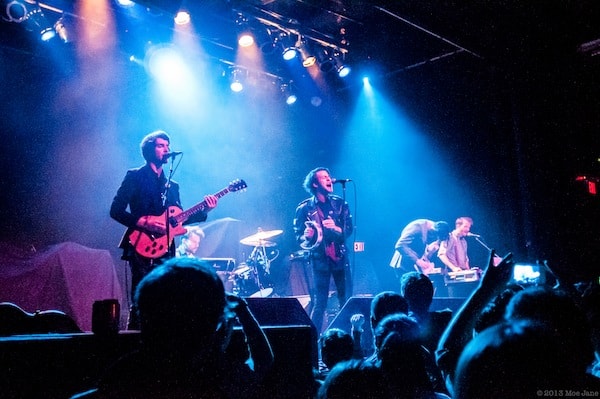
TV: You guys also played Oxegen festival in Ireland back in the early days of the band.
AK: That was actually our first show as Nightbox. That was terrifying.
TV: Composed of a group of old friends, siblings, and roommates, Nightbox has referred to themselves not only as a band, but also as a brotherhood. Tell me what that means for you as songwriters and performers.
AK: For me, I think we’ve gotten to the point where we know each other so well that we let a lot of things slide and know when to give each other space. I can know what Tebbitt is thinking in a given situation, and I could say the same for the other three guys. It helps with every aspect of our relationship because we really are like a gang. Working on songs, we don’t have to tiptoe around in case we are hurting each other’s feelings, because there’s never any offense given. Ever.

